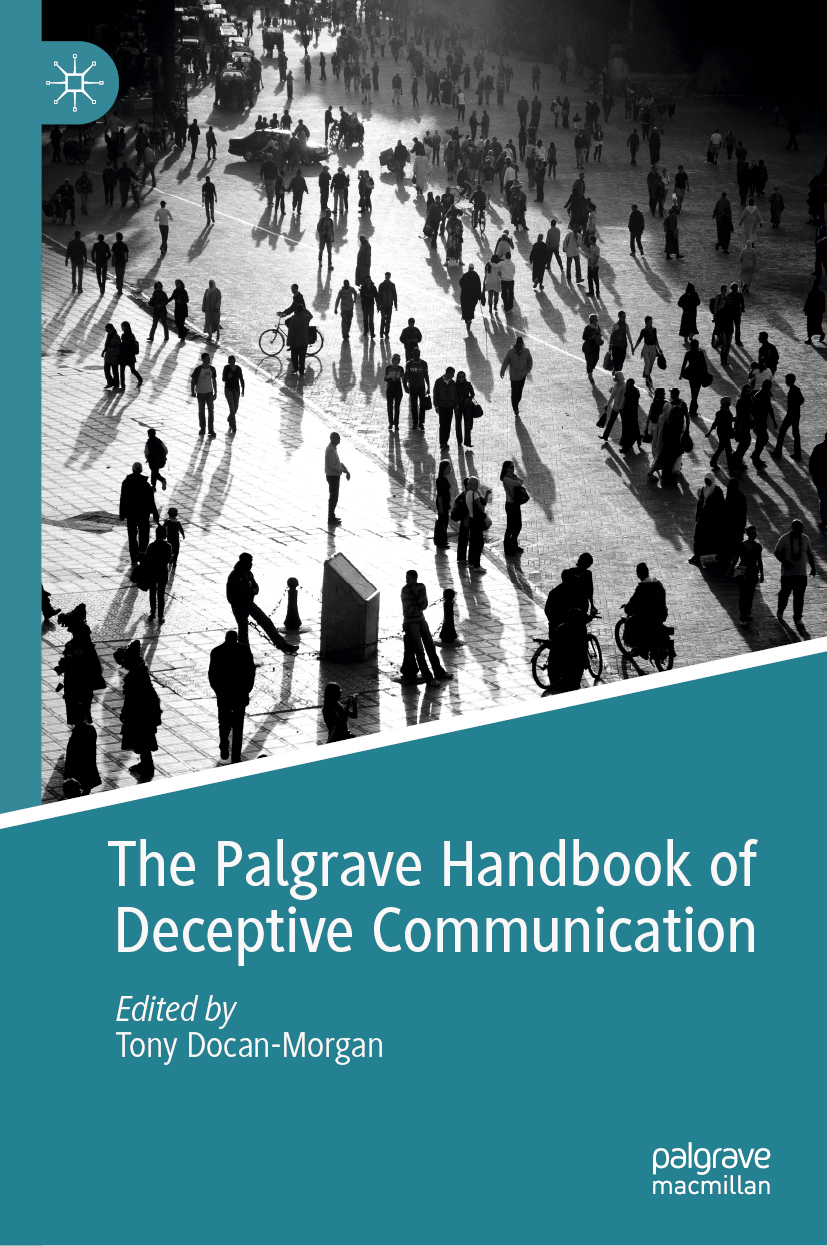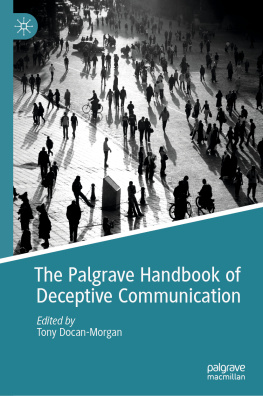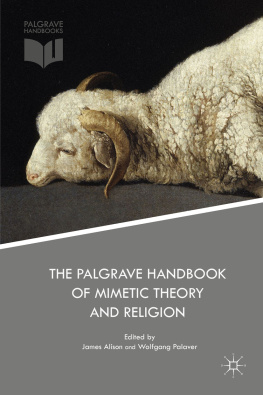Tony Docan-Morgan - The Palgrave Handbook of Deceptive Communication
Here you can read online Tony Docan-Morgan - The Palgrave Handbook of Deceptive Communication full text of the book (entire story) in english for free. Download pdf and epub, get meaning, cover and reviews about this ebook. year: 2019, publisher: Springer International Publishing, genre: Politics. Description of the work, (preface) as well as reviews are available. Best literature library LitArk.com created for fans of good reading and offers a wide selection of genres:
Romance novel
Science fiction
Adventure
Detective
Science
History
Home and family
Prose
Art
Politics
Computer
Non-fiction
Religion
Business
Children
Humor
Choose a favorite category and find really read worthwhile books. Enjoy immersion in the world of imagination, feel the emotions of the characters or learn something new for yourself, make an fascinating discovery.
- Book:The Palgrave Handbook of Deceptive Communication
- Author:
- Publisher:Springer International Publishing
- Genre:
- Year:2019
- Rating:4 / 5
- Favourites:Add to favourites
- Your mark:
- 80
- 1
- 2
- 3
- 4
- 5
The Palgrave Handbook of Deceptive Communication: summary, description and annotation
We offer to read an annotation, description, summary or preface (depends on what the author of the book "The Palgrave Handbook of Deceptive Communication" wrote himself). If you haven't found the necessary information about the book — write in the comments, we will try to find it.
The Palgrave Handbook of Deceptive Communication — read online for free the complete book (whole text) full work
Below is the text of the book, divided by pages. System saving the place of the last page read, allows you to conveniently read the book "The Palgrave Handbook of Deceptive Communication" online for free, without having to search again every time where you left off. Put a bookmark, and you can go to the page where you finished reading at any time.
Font size:
Interval:
Bookmark:


Cover image: Mike Hill
This Palgrave Macmillan imprint is published by the registered company Springer Nature Switzerland AG
The registered company address is: Gewerbestrasse 11, 6330 Cham, Switzerland
The Palgrave Handbook of Deceptive Communication unravels the topic of lying and deception in human communication, offering an interdisciplinary and comprehensive examination of the field, rethinking current approaches to the subject, presenting original research, and offering direction for future investigation and application. Scholars from around the world investigate historical perspectives on the study of lying and deception, the myriad forms of deceptive behavior, cross-cultural perspectives on deceit, moral dimensions of deceptive communication, theoretical approaches to the study of deception, and strategies for detecting and deterring deceit. Truth-telling, lies, and the many gray areas in-between are explored in the contexts of identity formation, interpersonal relationships, groups and organizations, social and mass media, marketing, advertising, law enforcement interrogations, court, politics, and propaganda. This handbook is designed for advanced undergraduate and graduate students, academics, researchers, practitioners, and anyone interested in the pervasive nature of truth, deception, and ethics in the modern world.
The Palgrave Handbook of Deceptive Communication is particularly unique because of its diverse disciplinary, methodological, theoretical, and applied perspectives. More than 100 prominent and emerging deception scholars have generously written 51 chapters for this volume. Contributors come from an array of fields, including communication studies, psychology, sociology, anthropology, philosophy, ethics, law, criminology and forensic science, psychiatry and behavioral neuroscience, counseling, literature, linguistics, business, management, journalism, advertising, public relations, marketing, and political science. The substantial collection of multidisciplinary knowledge in the current handbook serves as platform from which new questions, investigations, and discoveries will emerge.
The term deceptive communication was chosen purposefully for the title of this handbook. Stated simply, human deception is communicative . It involves senders and receivers, information or message exchange, and consequences that can be small or large, short- or long-term, personal or public. What makes deception distinct from many other forms of communication is that at least one communicator in the interactionregardless of contextmanipulates words, behaviors, texts, objects, and/or appearances so that others will form a false impression. Stated more directly, deceptive communication is the exchange of information that is known by the communicator to be inaccurate and/or misleading. What constitutes deception in daily interaction is context dependent and based on communicators perceptions of various factors such as intent and awareness. When we approach the topic of deception as a multifaceted communicative phenomenon, we are better able to explain, describe, predict, and in some instances control how deception and truth-telling unfold.
The communication of truth and deception is a phenomenon that has affected and will continue to affect humans in their personal, professional, and civic lives. Yet, the ability to ask questions and find answers about deceptive communication is a powerful force. As we search for and find truth about deceptive communication, the realized and potential outcomes are substantialbecoming more literate consumers of information, more skilled message creators, and more impactful in creating a just and humane world.
This handbook moved from an idea to reality with the support of a number of individuals and organizations, for which I am extremely grateful.
First, thank you to all of the outstanding contributors for your hard work, deep insight, and commitment to uncovering truth. I hope our collaboration in this volume leads to future endeavors with one another. I express my deepest gratitude to all of you.
Second, I am grateful to the University of Wisconsin-La Crosse (UWL) for providing support in the form of a sabbatical to work on this volume. I am thankful to UWLs excellent leadership, as well as the institutions commitment to fostering curiosity and life-long learning through collaboration, innovation, and the discovery and dissemination of new knowledge. I am also grateful to be a part of UWLs College of Arts, Social Sciences, and Humanities, where the mission of fostering intellectual curiosity and creativity is a reality. Thank you specifically to Dr. Linda Dickmeyer for your support and encouragement, my colleagues in the Department of Communication Studies and throughout UWL, and the many curious and engaged students I have had over the years. I am proud to call UWL my academic home.
Third, I offer my gratitude to Palgrave Macmillan and their staff for believing in and supporting this project.
Finally, a personal thank you to family and friends who have supported my endeavors, including this project. Sara, my wife, has given me endless encouragement, support, and love. Thank you for believing in me, your patience, and being our familys rock. Thank you to my childrenWilliam, Hope, and Abefor your love, affection, and joy; to my parents and sister for continual insight, motivation, and loving support; and to my best friendsAlan, Ale, Jrg, and Pavakwho always offer perspective, encouragement, and laughs. I am lucky and eternally grateful to have you all in my life.
Font size:
Interval:
Bookmark:
Similar books «The Palgrave Handbook of Deceptive Communication»
Look at similar books to The Palgrave Handbook of Deceptive Communication. We have selected literature similar in name and meaning in the hope of providing readers with more options to find new, interesting, not yet read works.
Discussion, reviews of the book The Palgrave Handbook of Deceptive Communication and just readers' own opinions. Leave your comments, write what you think about the work, its meaning or the main characters. Specify what exactly you liked and what you didn't like, and why you think so.













